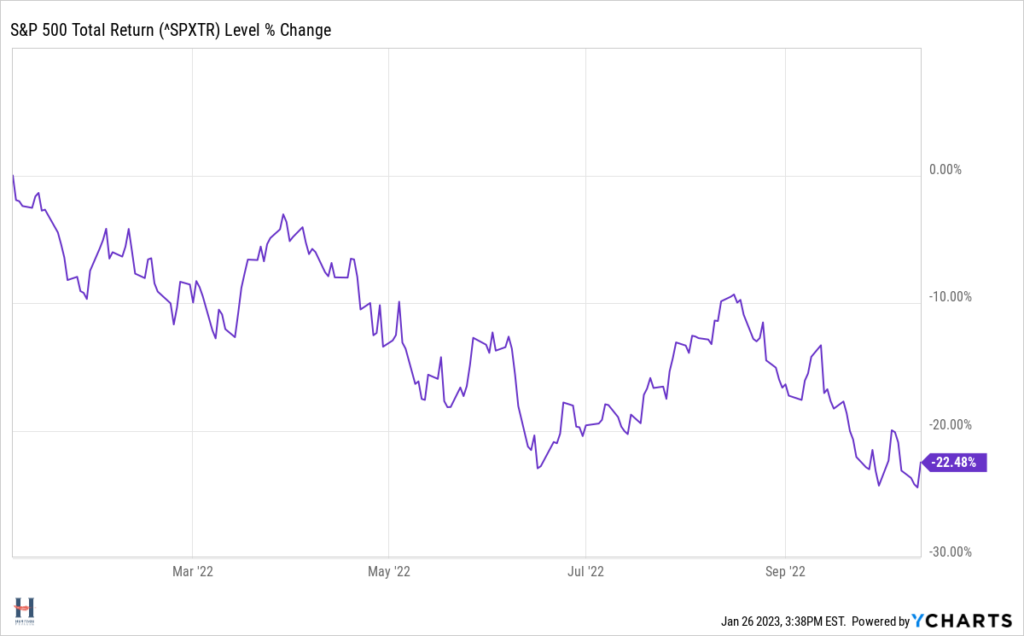Introducing My Bearish Friend
I have a very good friend who’s usually bearish on stocks. He’s an excellent stock picker who gets caught up in macroeconomic concerns that he thinks will impact earnings.
I’ve learned more from him about the markets than anywhere else, but think his concerns are overstated and love telling him so. Apparently I’m a perma-bull.
He entered this year bearish. I remained blissfully optimistic. We argued (I won, and until he gets his own blog you’ll never hear otherwise), and I thought I’d walk you through my victory for a look at both sides of the outlook coin.
Defining Bearishness
My bearish friend surprised me in late December by predicting a lost decade in stocks. The S&P 500 was already 22% off its-all time high.

I pounced.
A lost decade in stocks from here? I’ll take that bet.
He backpedaled.
Well, not from here, but from the market peak.
I’ll still take it, although I called him out on his softening stance. From January 4, 2022 through January 4, 2032 I’ll bet you the market has a positive return.
He backpedaled again.
Well, not lost, but returns will be less than they’ve been historically.
I didn’t take that bet. The market returns about 10% a year. If it returns 9.5%, which is an excellent decade, I’d lose.
Then he tried for sub 5% real returns for the decade.
Didn’t take that either. It’s the same bet.
We settled on whether the market gets to 4,500 or 3,500 next. Do we retest the lows or are we in a new bull that started last October?
When listening to investment pessimism make sure you understand what exactly someone is pessimistic about and what it means. A conversation about a lost decade ended up being about less than average returns. Concerns are often exaggerated to make a point.
Bashing the Fed
At one point, my bearish friend said that the only way he could lose the bet was if the Fed started printing money again. Looser monetary policy helps markets, and right now we’re in a tight monetary environment. I agree and it’s what I wrote in Why to Watch (and not fight) the Fed. But people who are overly bearish on stocks love to blame the Fed and other circumstances for their unrewarded pessimism. They miss that the world wants and needs economic growth and positive capital market returns. It isn’t just Fed juice.
Growth and positive returns are the norm and long-term trend. Contractions and bear markets are blips we have to accept along the way.
Recession Fears
My bearish friend’s main point about the market continuing to struggle into 2023 is that a recession is coming and the market had not fully priced in the resulting hit to corporate earnings.
He may be right about a recession. Our Chief Investment Officer has been calling for one, leading economic indicators concur, the Fed expects higher unemployment, and the best-case scenario of a soft-landing while inflation is tamed seems like an unrealistic Goldilocks outcome.
But…
I think the stock market sell-off that already happened signaled the economic slowdown, and recovery comes next.
I recently wrote in Thoughts on Our 2023 Market Outlook that the strength in the energy sector may have masked that corporate earnings have slowed, and the disconnect between a potential recession and earnings estimates may be overstated.
And just because a recession is plausible doesn’t mean we know how deep it’ll be so we don’t know how it will impact corporate earnings.
It’s also possible we’ve already had the recession.
The first two quarters of 2022 saw negative GDP growth – -.41% and -.14%. I don’t want to debate whether they’ve changed the recession definition. Two quarters of negative GDP growth wasn’t it despite what you may have heard, but it’s a factor. So, if we’ve already had two quarters of GDP contraction maybe we’re not going to get the recession we’re expecting? Or maybe we are.
No one knows what the economy is going to do, when it’s going to do it, and what the investment impact will be. You can’t overthink this and let it knock you out of a long-term investment strategy.
Stay tuned…for all our sake’s I hope I win the bet.
Suggested Reads
CNBC – Investor Friend or Foe?
Protecting Your Portfolio From The News
